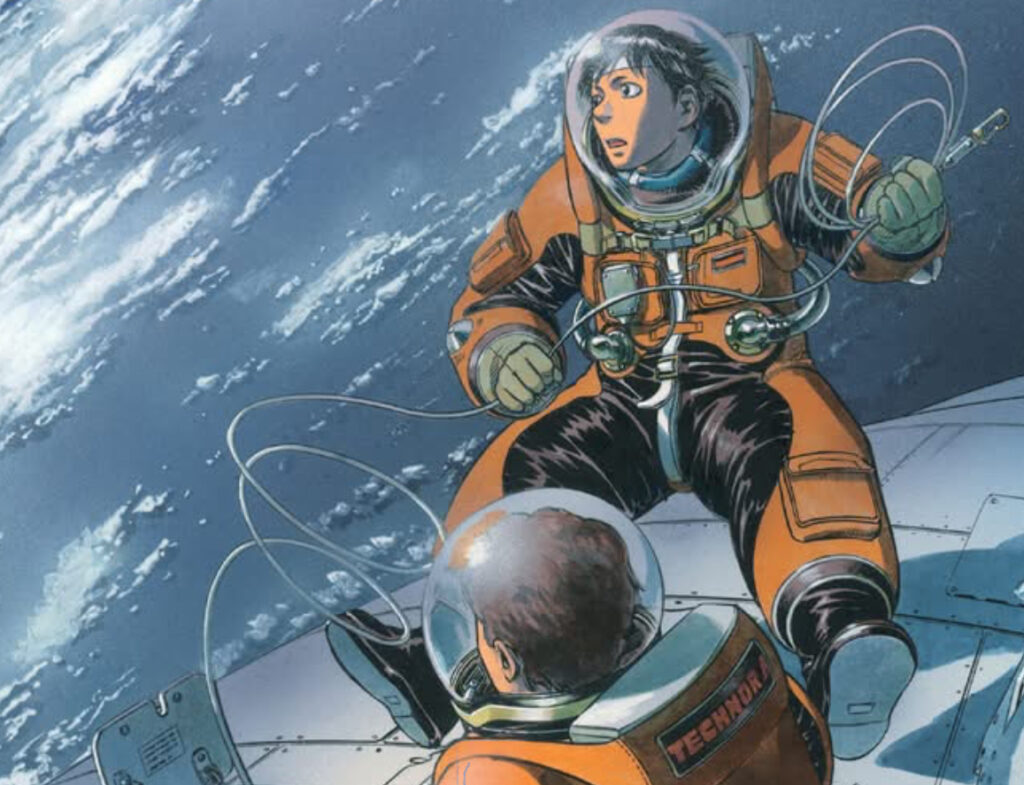“Sitting in a tin can, far above the world”—the line, immortalized by David Bowie’s “Space Oddity,” encapsulates a peculiar kind of loneliness that belongs only to space. A floating detachment, a disconnection not just from Earth but from the people, the noise, the gravity that defines human experience. When that line appears as a visual cue in Planetes Volume 1 by Makoto Yukimura, it does more than reference a classic song. It sets the emotional tone for one of the most grounded, introspective science fiction stories ever told.
At first glance, Planetes is a hard sci-fi manga about space debris collectors in the late 21st century. But Yukimura isn’t interested in just the mechanics of orbital physics or the logistics of space travel. He uses the vast silence of space to examine something deeply human: the desire for meaning, the ache of distance, and the fragile thread that connects people even when they’re millions of miles apart.
The Tin Can in Space
In Planetes, the “tin can” is both literal and metaphorical. It’s the cramped, metal-clad debris ship where the main characters—Hachimaki, Fee, Yuri, and others—spend most of their time. It’s their workplace, their shelter, their confinement. Inside it, they eat, bicker, sleep, and stare out into the stars. The ship is a machine, sure, but it’s also a prison of sorts—one where the isolation is intensified by the knowledge that Earth is always beneath them, always out of reach.
For Hachimaki, the main character, the tin can becomes a site of existential crisis. He’s obsessed with the idea of owning his own spaceship, of going further into space than anyone has before. But as the story progresses, this dream becomes complicated by questions he didn’t expect to ask: Why do I want this? What am I trying to escape? And who am I without gravity to hold me down?
The “tin can” then shifts from being just a setting to a symbol. It’s a stand-in for the emotional containers we all live in—our ambitions, our anxieties, our isolation. It’s a place where identity either forms or fractures.
Far Above the World
The positioning “far above the world” is important. In Yukimura’s hands, space isn’t just a backdrop for high-tech adventures. It’s a void—a place where human vulnerability is exposed. There’s a scene early in Volume 1 where the crew retrieves a dog’s corpse drifting in orbit, left behind from an earlier mission. The body floats silently, a haunting reminder of how easy it is to be forgotten in space. That moment sticks. It’s not played for drama—it just is. Space doesn’t care. It doesn’t mourn. But people do.
Yukimura masterfully contrasts the infinite blackness of space with the inner lives of his characters. Yuri mourns his wife, who died in an orbital accident. Fee, the pilot, wrestles with smoking addiction and the encroaching presence of space terrorism. And Hachimaki? He starts to question if the stars will ever fill the emotional void he’s been carrying with him.
“Sitting in a tin can, far above the world” becomes a line not just about physical distance, but emotional detachment. And that’s where Planetes hits its stride. It shows that space, in all its majesty, doesn’t erase human problems. It just magnifies them.
Makoto Yukimura’s Visual Language
Makoto Yukimura’s artwork plays a huge role in creating this feeling of alienation. He draws spacecraft with exacting detail, showing bolts, wires, and hull seams with mechanical precision. But the most powerful panels are the ones where nothing happens—where the characters simply float, drift, or stare out of a viewport. These quiet moments, often with no dialogue, say everything.
When the line “sitting in a tin can…” appears in one of these frames, it lands with real weight. You feel the stillness. You feel the pressure of the vacuum outside and the claustrophobia inside. There’s no sound in space, but Yukimura makes you hear the silence.
His paneling reinforces this mood. He often uses wide, open space across the page to contrast the tiny figures of the characters. You see just how small they are compared to the cosmos. It’s humbling, and sometimes suffocating. But it’s never hopeless.
The Emotional Core of Planetes
What makes Planetes so effective—so quietly devastating—is that it never turns its back on humanity. Even as Yukimura pushes his characters into emotional corners, he offers them connection. He doesn’t let the story slip into full cynicism. The tin can might be cold, but the people inside it aren’t.
In one key scene, Hachimaki suffers a psychological break after a brush with death in deep space. For days, he isolates himself, questioning everything. His dream of space exploration, his worth as a person, even his sanity. Eventually, he begins to re-emerge, not through a dramatic epiphany but through conversation, routine, and a renewed sense of purpose.
This is what Planetes is ultimately about—not the romance of space, but the grit of being human in it. The loneliness, yes. But also the relationships that keep us tethered. The dreams that propel us forward. The healing that happens, slowly, when we stop trying to outrun gravity and start learning how to live with it.
The Bigger Picture
Yukimura would go on to create Vinland Saga, another masterwork about purpose, violence, and transformation. But the seeds of his storytelling strength were already blooming in Planetes. His ability to blend philosophical introspection with grounded characters, set against massive historical or cosmic backdrops, is rare. And it’s clear, even in Volume 1, that he sees science fiction not as escape, but as reflection.
“Sitting in a tin can, far above the world” is a lyric about loss. In Planetes, it’s also about longing—for home, for meaning, for gravity in more than the physical sense. Yukimura captures that beautifully.
Planetes Volume 1 by Makoto Yukimura is available in paperback and upcoming Deluxe Edition format wherever you buy books.
No comments yet.








